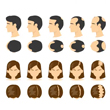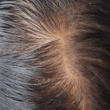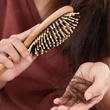Can Vitamin B12 Deficiency Cause Hair Loss?
Introduction1
Hair loss is a problem that affects both men and women. There are various causes of hair loss, including genetics, stress, hormonal changes, certain medications, and nutrient deficiencies.

If you are concerned about your hair loss and wonder isf the condition might be due to a Vitamin B12 deficiency, keep reading to learn about the possible link between Vitamin B12 deficiency and hair loss.
Vitamin B12 Hair Loss
Vitamin B12 is a water-soluble vitamin that your body needs for critical metabolic processes, including red blood cell formation and DNA production. Vitamin B12 deficiency can cause anaemia, nerve damage, and even psychiatric problems.
As Vitamin B12 is a necessary nutrient for hair growth and scalp health, it is safe to say that low levels of Vitamin B12 are associated with hair loss.
Taken in supplement form, Vitamin B12 can help reverse thinning hair by helping restore the natural thickness of your hair follicles. Some experts maintain that this is the best treatment option available if you suffer from thinning hair due to Vitamin B12 deficiency.

Vitamin B12 may improve blood flow to your scalp and reduce symptoms of alopecia areata — a condition that causes patchy hair loss and bald spots in some people — by reducing inflammation.
Vitamin B12 works by stimulating the melanin pigment and keratin protein production in your body, both of which are vital for hair growth. Vitamin B12 also improves blood circulation and promotes the development of new cells, which results in stronger and healthier hair follicles.
Benefits of Getting Enough Vitamin B12 in Your Diet2
Adequate levels of Vitamin B12 are essential for healthy hair growth. Vitamin B12 is a vital nutrient because it helps build red blood cells that carry oxygen throughout the body.
B12 is naturally found in animal products such as fish, shellfish, meat (especially liver), eggs, milk and cheese.
Vitamin B12 also helps form haemoglobin which carries oxygen from the lungs to the rest of the body. Without enough oxygen being carried throughout the body, your hair can become dry and brittle.
Furthermore, cell division is essential for healthy hair growth because it allows new cells to replace damaged ones. When cell division does not occur adequately due to a lack of Vitamin B12 in your diet or a deficiency in this nutrient, you may develop patches of hair loss
Vitamin B12 is required to make red blood cells and keep nervous systems healthy. It also helps break down fat, protein, and carbs for energy.
If you're deficient in Vitamin B12, your body tissues won't be able to absorb the nutrients from the food you eat. Many of the symptoms associated with a deficiency are the same as those experienced when one is malnourished.
Depending on how severe your deficiency is, you could experience symptoms including weight loss, weakness, and fatigue.
You could also develop anaemia if your body doesn't produce enough healthy red blood cells. Those cells carry oxygen around your body, so if your body can't have enough, you may feel out of breath all the time.
How Can You Avoid Hair Loss With Vitamin B12 Supplements?
itamin B12 deficiency is a growing concern for many people. Although there are many ways to include this vitamin in our diets, some people may struggle to keep their bodies in balance. Just how lack of Vitamin B12 often causes anaemia, hair loss can also signify that you need to supplement your diet with more of this vitamin.
Understanding why Vitamin B12 might cause hair loss helps to know how the body uses it. Vitamin B12 works with other nutrients to produce red blood cells and maintain a healthy nervous system.
A lack of Vitamin B12 inhibits the production of specific essential proteins that keep hair strong and healthy. Without these proteins, hair becomes damaged over time and breaks easily.
Treating hair loss is the easiest way to correct the problem. Many over-the-counter shampoos claim to help regrow hair, but they don't necessarily work. Therefore, the only real solution is to take a vitamin supplement, such as Biotin pills. These are relatively inexpensive and have few adverse side effects.
Taking vitamin supplements can help reverse the damage caused by this deficiency and may also help prevent future damage from occurring if you are at risk.
If you have been experiencing hair loss, it is essential to see a doctor to get checked for any underlying causes of your condition. You should also make sure that you have enough Vitamin B12 in your diet or take supplements if necessary.
Maintaining a healthy and stress-free lifestyle and consuming nutritious meals is also important for optimal hair care. Visit your dermatologist for any hairfall-related complaints to get an optimal diagnosis and formulate a management plan.
Conclusion1
While it is evident that many vitamin deficiencies can adversely affect hair quality and health, it has yet to be conclusively demonstrated that B12 lack definitively causes hair loss.
Despite these issues, the consensus is that it would be prudent to ensure an adequate supply of all important vitamins, including vitamin B12, as part of a comprehensive hair health plan.
Myth Busters HairFall

Androgenetic Alopecia - Everything You Need To Know
Have you been experiencing excessive hair fall over a prolonged period of time? It could be an early sign of androgenetic alopecia. It is a hair loss disorder common in both genders and can lead to progressive thinning and even baldness in some patients if not caught and treated early.

How To Make Hair Grow Faster For Men
A head full of healthy hair is a matter of confidence. Hair has its own mechanism of growing and shedding, and it is when this mechanism is thrown off that growth is hindered. Especially in the case of males, hair growth faces a lot of hiccups that can easily be managed.

Female Pattern Baldness - Causes & Treatments
Have you suddenly noticed an increase in the number of hair strands on your pillow in the morning? Or is your ponytail getting thinner by day? Well, you might be suffering from female pattern baldness. While that does sound scary, identifying it early on is key to treating this condition effectively. So keep reading to know what this is, how you can identify it, and most importantly, what treatments you can avail of to get your beautiful lustrous hair back.

What Are The Reasons For Hairfall?
Almost everyone experiences some amount of hair thinning over the years. Shedding around 50 to 100 single strands of hair per day is considered normal. However, losing more than 150 strands a day, experiencing sudden thinning, or developing circular bald patches on your scalp are reasons for concern. Hair loss occurs when new hair doesn’t grow fast enough to replace the amount of hair you lose daily. Hair can fall due to various reasons, with hereditary hair loss and poor nutrition being the most common hair fall reasons.

Expert Approved Tips For Hair Growth
What can be more debilitating than seeing hundreds of hair strands shedding from your scalp every time you brush your hair? Also, excessive molting occurs during seasonal changes that can be very stressful for you. Although it’s okay to lose between 50-100 strands every day, according to the American Academy of Dermatology, the problem occurs when you start shedding more than normal. But that doesn’t mean you have to feel helpless as there are ways to grow your hair back. Even if you are coping with baldness or alopecia, certain hair growth tips from dermatologists can come to your rescue. Read on to discover how these tips can be your savior when abnormal hair fall problems are in sight.
Trending Videos
+ 2 Sources
LMRC - GGI-CO-A2-DMA-300026127-300026127-WM-C22-0683
© 2021 Dr. Reddy’s Laboratories Ltd. All rights reserved.